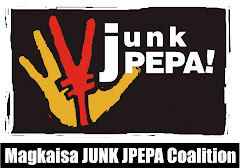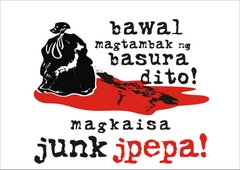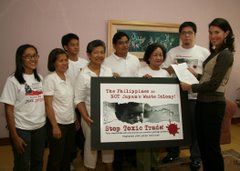Is there really a need to have a provision on used cars in an economic partnership agreement?
Who insisted on having this provision belatedly inserted into the JPEPA?
1. Article 27 of the JPEPA provides for Cooperation in Relation to Export. It states:
The Parties shall cooperate with each other on the utilization of appropriate mechanism on the conformance with the importing Party's safety and environmental standards, such as roadworthiness and vehicle emission standards, of used four-wheeled motor vehicles as may be agreed by the Parties, exported from the exporting Party.
2. During the JPEPA hearing on Economics, September 20, 2007, the pro-JPEPA government panel attempted to explain the inclusion of the said provision by saying that they "insisted" on that provision to "protect the Filipino people." This is a misleading and erroneous argument that finds no support in the ACTUAL text of the JPEPA. The text itself shows the intention to allow market access for used four-wheeled motor vehicles despite the existence of Executive Order 156 that clearly prohibits the same and the Supreme Court ruling [1] that upheld the validity of the same Order.
3. While Article 27 speaks of mere cooperation, the Annex [2] of the JPEPA actually provides for the following:
(a) The Philippines may apply import duties specified in Annex A of the Executive Order No. 418 of the Philippines dated April 4, 2005, as may be amended(hereinafter referred to as "EO 418") on used motor vehicles among the originating goods to which this note is applied, in addition to customs duties as indicated in Column 4.
(b) For the purposes of subparagraph (a) above, the Philippines shall follow its normal domestic procedures in any amendment of EO 418, and shall notify Japan of the amendment of EO 418 in 60 days advance of its publication.
(c) On the request of either Party, the Parties shall negotiate on issue such as market access conditions on used motor vehicles.
4. Predictably, the government panel invoked the provision in the JPEPA's preamble which states that: "Recognizing the importance of the implementation of measures by the Governments of the Parties in accordance with their respective laws and regulations." This is an unacceptable argument.
5. If Executive Order 156 specifically prohibits the importation of used four-wheeled motor vehicles, the Executive Department had the obligation to ensure that the same Order appears in the actual text of the JPEPA. There is no excuse for them on the basis of mere oversight. Executive Order 418, passed on April 4, 2005 appears on the text of the JPEPA while EO 156 is conveniently absent despite the fact that this Order has been in place since December 12, 2002. The validity of EO 156 has also been upheld by no less than the highest court of the land, the Supreme Court of the Philippines.
6. This provision is a serious threat to the 77,000 workers of the automobile industry and thousands more in allied industries (approx. 350,000).
7. It must be emphasized that this provision DOES NOT exist in Japan's agreements with Malaysia, Indonesia, and Thailand.
8. This provision also DID NOT EXIST in the Working Draft of the JPEPA, April 21, 2003.
9. It must also be emphasized that the JPEPA contains another provision that threatens whatever protection any industry has under existing national laws. Article 4 of the treaty is an effective and blatant attempt by the Executive Department to usurp the legislative power of the Philippine Senate and the House of Representatives. It provides for the
Review of Laws and Regulations:
Each Party shall examine the possibility of amending or repealing laws and regulations that pertain to or affect the implementation and operation of this Agreement, if the circumstances or objectives giving rise to their adoption no longer exist or if such circumstances or objectives can be addressed in a less trade-restrictive manner.
10. The provision in article 4 WAS NOT PRESENT in the Working Draft of the JPEPA, April 21, 2003. This provision also DOES NOT EXIST in Japan's current agreements with Malaysia, Indonesia, and Thailand.
11. The protection against the importation of used four-wheeled vehicles provided by EO 156 is seriously threatened because by virtue of Article 4 of the actual text of the JPEPA, nothing can stop the Executive Department from issuing a subsequent Order repealing Executive Order 156 and subsequently allowing the importation of used car vehicles.
Why would the Executive Branch include Article 4 and its corresponding obligations in the JPEPA when in fact, our Constitution clearly lodges the power to amend and repeal laws, on the Congress?
Why did the Executive Branch insist on usurping the power of the Legislative Branch by including Article 4 in the JPEPA and yet refused to give them a copy of the treaty; such that members of the House of Representatives still had to file a case before the Supreme Court?
These questions have not been answered by the pro-JPEPA panel.
We should ask them again. For the future of this nation.
JUNK JPEPA.
[1] Honorable Executive Secretary, et. al., vs. Southwing Heavy Industries, Inc., et. al. G.R. No. 164171, February 20, 2006
[2] Part 1, Section 1, #3, page 279
--






1 comment:
hindi na kilangan kasi we dont need them....See manila have a heavy traffic everyday...we have numerous number of four wheeled vehicle...worst im afraid we are getting some toxic materials from japan in our counrty...we wont benifit from it....our environment is a big issue that will be compromise here..So I want to say that im against this agreement...junk it!!!!!!!!!its no used at all..
Post a Comment